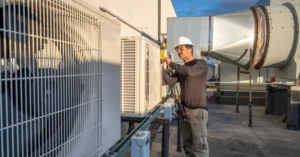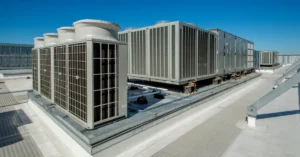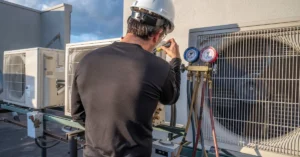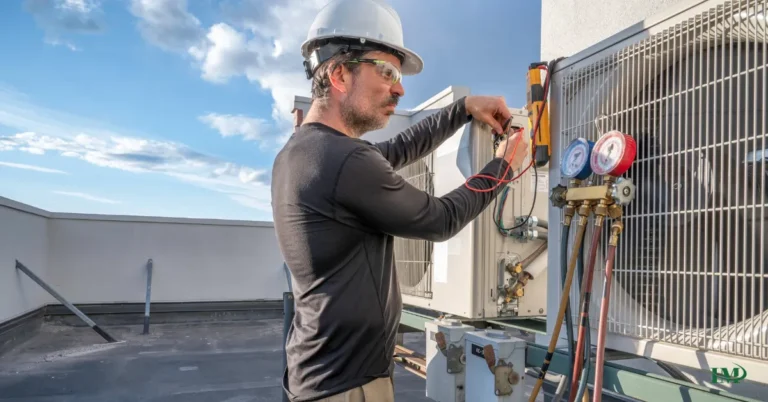Reliable Commercial HVAC Service in Sacramento for All Your Business Needs
In the dynamic business landscape of Sacramento, maintaining a comfortable and efficient environment is crucial for the productivity and satisfaction of employees and customers alike. Central to this goal is a robust HVAC (Heating, Ventilation, and Air Conditioning) system.
Given Sacramento’s diverse climate – characterized by hot summers and cool winters – a well-functioning HVAC system is essential for any commercial establishment. This guide aims to inform business owners about the various commercial HVAC services near them and provide insights into selecting the best commercial HVAC companies.
Understanding Commercial HVAC Systems
What is an HVAC System?
An HVAC system is an integrated setup designed to manage heating, ventilation, and air conditioning in a building. The primary components of a commercial HVAC system include:
Furnace: This component provides heating by burning fuel or using electric resistance. It distributes warm air through the ductwork.
Air Conditioner: Cools the air by removing heat and moisture from the indoor air and expelling it outside.
Ductwork: These are conduits used to deliver and remove air. The ductwork ensures that the conditioned air reaches all parts of the building.
Thermostats: Devices that control the temperature of the HVAC system. Modern thermostats are programmable and can be controlled remotely.
Importance of HVAC Services for Businesses
A reliable HVAC system is indispensable for creating a conducive working environment. Here are a few reasons why:
Comfort: Ensures a pleasant temperature, enhancing employee productivity and customer satisfaction. A comfortable environment helps in retaining customers and keeping employees happy.
Air Quality: Maintains indoor air quality by filtering out dust, allergens, and pollutants. Good air quality is essential for the health and well-being of everyone in the building.
Energy Efficiency: Modern, energy-efficient commercial HVAC systems lead to significant cost savings. An efficient system reduces energy consumption, leading to lower utility bills.
Operational Continuity: A well-maintained system minimizes downtime, ensuring uninterrupted business operations. Regular maintenance prevents unexpected breakdowns that could disrupt business activities.
Types of Commercial HVAC Services
Installation Services
 When seeking commercial HVAC installation, it’s important to choose licensed commercial HVAC contractors to ensure optimal system performance. Key considerations include the size of the building, specific heating and cooling needs, and energy efficiency goals. Professional installation ensures that the system is correctly sized and properly installed, which is critical for its longevity and performance.
When seeking commercial HVAC installation, it’s important to choose licensed commercial HVAC contractors to ensure optimal system performance. Key considerations include the size of the building, specific heating and cooling needs, and energy efficiency goals. Professional installation ensures that the system is correctly sized and properly installed, which is critical for its longevity and performance.
Site Assessment: Before installation, a thorough assessment of the site is conducted to understand the specific requirements.
System Design: Based on the assessment, the HVAC system is designed to meet the unique needs of the business.
Installation: The installation process includes setting up the furnace, air conditioner, ductwork, and thermostats.
Testing and Calibration: After installation, the system is tested and calibrated to ensure optimal performance.
Maintenance Services
Regular commercial HVAC maintenance is vital to keep an HVAC system running efficiently. Common maintenance tasks include:
Filter Changes: Regular replacement of filters to ensure clean air flow. Dirty filters can reduce system efficiency and air quality.
System Inspections: Routine checks to identify and rectify potential issues. Inspections can prevent minor problems from becoming major repairs.
Cleaning: Keeping the components clean to prevent dust buildup and improve efficiency. Clean components operate more efficiently and have a longer lifespan.
Maintenance contracts can provide peace of mind, ensuring that the system is serviced at regular intervals and reducing the likelihood of unexpected breakdowns.
Repair Services
Despite regular maintenance, HVAC systems can experience issues that require professional HVAC commercial repair. Common signs that repair services are needed include:
Unusual Noises: Strange sounds from the system can indicate mechanical issues.
Inconsistent Temperatures: Uneven temperatures across different areas suggest problems with the system.
Increased Energy Bills: Higher-than-usual energy bills can indicate that the system is not operating efficiently. Timely repairs are crucial to avoid major disruptions to business operations and to extend the life of the HVAC system.
Diagnostic Services: Identifying the root cause of the problem.
Repairs: Fixing the identified issues to restore system functionality.
Emergency Repairs: Offering 24/7 commercial HVAC service to address urgent issues promptly.
Replacement Services
There comes a time when repairing an old HVAC system is no longer cost-effective. Indicators that replacement might be necessary include:
Age of the System: The system is over 10-15 years old.
Frequent Breakdowns: Frequent repairs indicate that the system is nearing the end of its life.
Outdated Technology: The system uses outdated, less energy-efficient technology.
Modern HVAC systems offer significant improvements in energy efficiency and performance, making replacement a worthwhile investment.
Assessment: Evaluating whether the current system needs replacement.
Selection: Choosing an affordable commercial HVAC system that meets the needs of the business.
Installation: Professional installation of the new system.
Calibration: Ensuring the new system operates at peak efficiency.
Choosing the Right HVAC Service Provider in Sacramento
Selecting a reputable HVAC service provider is critical to ensure quality service. Here are some factors to consider:
Factors to Consider
Licenses and Certifications: Ensure the provider has the necessary licenses and certifications to operate in Sacramento. This guarantees that they meet industry standards and regulations.
Experience: Look for providers with extensive experience in HVAC solutions for businesses. Experienced contractors are likely to deliver better service.
Customer Reviews: Check reviews and testimonials to gauge the provider’s reputation and customer satisfaction. Positive reviews indicate reliable and satisfactory service.
Questions to Ask Potential Providers
To make an informed decision, ask potential HVAC service providers the following questions:
What brands of HVAC systems do you work with? Ensure they can service the brand of your system.
What is your response time for emergencies? Quick response times are crucial for emergencies.
Can you provide references from other commercial clients? References can provide insight into their reliability and service quality.
These questions will help you assess the provider’s capabilities and reliability.
Benefits of Professional HVAC Services
Improved System Efficiency
Professional HVAC services enhance system performance, leading to significant energy savings. A well-maintained system operates more efficiently, reducing energy consumption and lowering utility bills.
Optimized Performance: Regular maintenance and professional servicing keep the system running at its best.
Energy Savings: Efficient systems consume less energy, leading to lower operational costs.
Extended Equipment Lifespan
Regular professional maintenance and timely repairs can significantly extend the lifespan of HVAC equipment. This reduces the frequency of costly replacements and contributes to long-term cost savings.
Preventive Care: Routine checks and maintenance prevent major breakdowns.
Longer Lifespan: Well-maintained systems last longer, providing better value for money.
Enhanced Indoor Air Quality
HVAC systems play a crucial role in maintaining indoor air quality. Professional services ensure that the system is free from dust, mold, and other pollutants, promoting a healthier environment for employees and customers.
Air Filtration: Regular filter changes and cleaning remove pollutants.
Health Benefits: Improved air quality reduces the risk of respiratory issues and allergies.
DIY Tips for Basic HVAC Maintenance
 While professional services are essential, there are simple maintenance tasks that business owners can perform:
While professional services are essential, there are simple maintenance tasks that business owners can perform:
Simple Maintenance Tasks
Changing Air Filters: Regularly replace filters to maintain airflow and system efficiency. This prevents dust buildup and improves air quality.
Cleaning Exterior Units: Keep the outdoor unit free from debris and vegetation. This ensures proper airflow and efficient operation.
Checking Thermostat Settings: Ensure thermostats are set correctly for optimal performance. Proper settings can enhance comfort and save energy.
When to Call a Professional
Certain issues require professional attention. Signs that it’s time to call an HVAC expert include:
Persistent or Unusual Noises: Indicating mechanical problems.
Significant Temperature Fluctuations: Suggesting system malfunctions.
System Not Responding to Thermostat Adjustments: Indicating control issues.
Attempting complex repairs without proper knowledge can lead to further damage and safety risks.
FAQ:
What is a Commercial HVAC?
A commercial HVAC (Heating, Ventilation, and Air Conditioning) system is an integrated setup designed to manage heating, ventilation, and air conditioning in commercial buildings such as offices, retail stores, restaurants, and industrial facilities. These systems are critical for maintaining a comfortable and healthy indoor environment, ensuring optimal air quality, and managing energy consumption efficiently in large spaces.
Why is Commercial HVAC So Expensive?
Commercial HVAC systems are often more expensive than residential systems due to several factors:
Complexity: Commercial HVAC systems are more complex because they must manage the climate control for larger spaces and more diverse environments within a building.
Capacity: These systems are designed to handle larger loads and often require more powerful components.
Customization: Commercial systems often need to be customized to fit the specific needs of the building, including zoning, varying usage patterns, and different environmental conditions.
Installation: The installation process is more involved, requiring significant planning, engineering, and often, structural modifications to accommodate larger equipment and ductwork.
Maintenance: Regular maintenance is crucial to ensure efficiency and longevity, which adds to the overall cost.
Compliance: Commercial systems must comply with stricter regulatory standards for safety, efficiency, and environmental impact, which can increase costs.
What’s the Difference Between Residential and Commercial HVAC?
There are several key differences between residential and commercial HVAC systems:
Size and Capacity: Commercial HVAC systems are generally larger and have a higher capacity to handle the heating and cooling needs of larger spaces.
Complexity: Commercial systems are more complex, often involving multiple zones, larger ductwork, and advanced control systems to manage different areas of a building.
Components: Commercial systems use more robust and durable components designed to handle the continuous operation and higher usage typical in commercial settings.
Installation: The installation of commercial systems is more involved, requiring specialized knowledge and often customization to fit the specific needs of the building.
Maintenance: Commercial systems require more frequent and detailed maintenance to ensure they operate efficiently and meet regulatory requirements.
Usage Patterns: Commercial systems are designed to handle varying usage patterns, such as peak hours and off-hours, which are less common in residential settings.
What Size Are Commercial HVAC Units?
The size of commercial HVAC units varies widely depending on the needs of the building. Commercial HVAC units are typically rated in tons, where one ton equals 12,000 BTU (British Thermal Units) per hour. Some general guidelines include:
Small Commercial Buildings: Units might range from 5 to 10 tons.
Medium Commercial Buildings: Units might range from 10 to 25 tons.
Large Commercial Buildings: Units might range from 25 to 50 tons or more.
The specific size required for a commercial HVAC unit depends on various factors such as the total square footage of the space, the number of occupants, the type of activities conducted within the space, insulation quality, and local climate conditions. An HVAC professional can perform a detailed load calculation to determine the appropriate size for a specific building.
Reliable Commercial HVAC Services from Sacramento’s Leading Builder
 Ensure your business remains comfortable and efficient with top-notch commercial HVAC services from the experts at Iron Mechanical, Sacramento’s trusted commercial builder. Our team of licensed and experienced professionals is dedicated to providing high-quality installation, maintenance, and repair services tailored to meet your unique business needs.
Ensure your business remains comfortable and efficient with top-notch commercial HVAC services from the experts at Iron Mechanical, Sacramento’s trusted commercial builder. Our team of licensed and experienced professionals is dedicated to providing high-quality installation, maintenance, and repair services tailored to meet your unique business needs.
As a full-service commercial builder, we understand the critical role HVAC systems play in supporting operational efficiency, occupant comfort, and long-term building performance.
Don’t wait for a breakdown to disrupt your operations—invest in regular maintenance and timely repairs to keep your HVAC system running smoothly all year round.
Contact Iron Mechanical today for a consultation and discover how our comprehensive HVAC solutions can enhance your business environment. For a limited time, new customers can enjoy a special discount on their first service appointment. Visit our website or call us now to schedule your service and ensure optimal climate control for your business.
